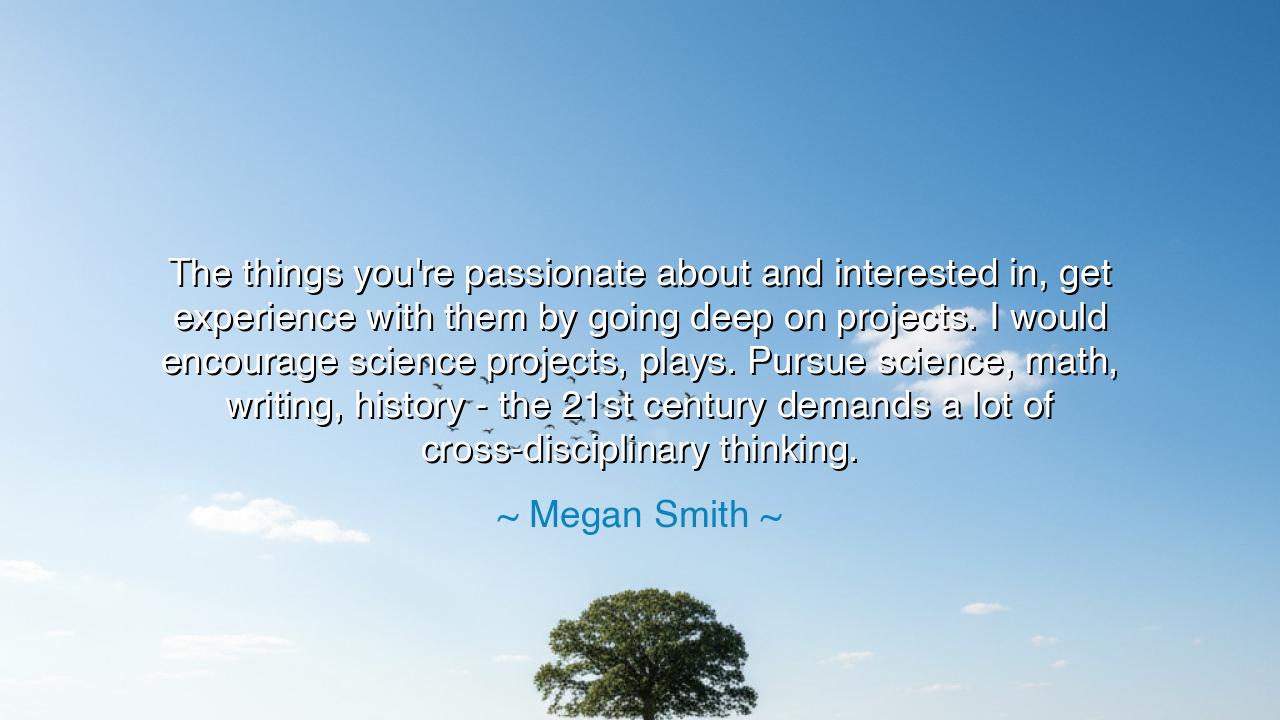
The things you're passionate about and interested in, get
The things you're passionate about and interested in, get experience with them by going deep on projects. I would encourage science projects, plays. Pursue science, math, writing, history - the 21st century demands a lot of cross-disciplinary thinking.






In the grand journey of life, where the pursuit of wisdom and mastery over one’s own craft forms the very foundation of human potential, the great Megan Smith offers a clarion call for the future: "The things you're passionate about and interested in, get experience with them by going deep on projects. I would encourage science projects, plays. Pursue science, math, writing, history – the 21st century demands a lot of cross-disciplinary thinking." In these words, Smith speaks to an ancient truth: that the pursuit of excellence is not achieved by skimming the surface, but by diving deep into the things that ignite our hearts and minds. This counsel is both a reminder and a challenge—to live fully, we must engage deeply with the world, seeking understanding through both individual disciplines and the connections that bind them together.
Consider the ancient Greeks, who laid the foundations for much of our modern thinking. They did not see knowledge as a set of isolated fields, but as an integrated whole. The philosophers of the classical world were as much scientists as they were artists, historians, and mathematicians. Pythagoras, for example, is known for his contributions to geometry, but he also sought to understand the nature of life itself through the balance of numbers. Similarly, Plato taught that true wisdom came from a harmonious understanding of philosophy, science, art, and spirituality. To the ancients, the deepest understanding of the universe required the application of the mind across multiple disciplines, much as Smith encourages us to do today.
In the world of ancient Rome, the figure of Marcus Aurelius stands as a testament to the power of cross-disciplinary thinking. As a philosopher and the emperor of Rome, Aurelius applied his study of Stoic philosophy not only to his personal life but also to the governance of the vast Roman Empire. He integrated lessons of ethics and reasoning into the policies of statecraft, demonstrating the profound impact of cross-disciplinary knowledge. Marcus Aurelius’ work is a reminder that the pursuit of knowledge in multiple fields does not dilute the mind but strengthens it, enabling us to apply our passion and understanding to practical endeavors that affect the world around us.
The call to dive deeply into our passions—whether it be science, math, writing, or history—is a reflection of the human quest to engage with the world in a holistic manner. Just as Leonardo da Vinci, a polymath of the Renaissance, seamlessly wove together the study of art, anatomy, engineering, and architecture, so too can we find our own place in the world by pursuing multiple disciplines. Leonardo did not limit his genius to any one field but saw the beauty in exploring connections across boundaries. His work in painting, such as the Mona Lisa, was deeply intertwined with his knowledge of the human body, while his studies in mechanics and flight were shaped by his artistic vision. In his life, as in the life Smith envisions, cross-disciplinary thinking was the key to both understanding and creation.
In our own time, the 21st century calls for a similar integration of knowledge and experience. As Smith wisely points out, the world no longer demands specialists who exist in silos. Instead, it requires individuals who can think across boundaries, who can combine the sharpness of the scientific mind with the creativity of the artist. This is particularly important as we face the challenges of our rapidly evolving world—whether it be in technology, climate change, or social justice. The solutions to these pressing issues are not found in any one discipline alone but in the synergy created when we bring together diverse perspectives. Just as the ancient Greeks looked to integrate their studies, so must we today, weaving together the threads of different knowledge to understand the complexities of the world around us.
The lesson of Smith’s words is one of profound empowerment and wisdom. To live with purpose and to fulfill our potential, we must go deep—into the things that ignite our souls and engage our minds. It is not enough to dabble in various subjects or to passively consume knowledge. We must commit ourselves to the pursuit of true understanding, whether that means experimenting in the lab, creating a work of art, or delving into the writings of history. Just as the ancient philosophers sought truth across all areas of knowledge, so too must we today be willing to embrace interdisciplinary exploration, for it is in the intersections of diverse fields that the greatest discoveries await.
So, let us take Smith’s message to heart and follow the example of those who have come before us—go deep, pursue the passion that calls to you, and seek to connect your curiosity with other fields. The world is filled with wonders, and it is only through dedicated effort, combined with a willingness to explore across boundaries, that we will truly come to know the universe. Whether you are drawn to science, art, history, or any other field, know that it is the deep, committed pursuit of knowledge that will shape not only your mind but the world you leave behind. Like the ancient sages, the polymaths of the Renaissance, and the great thinkers of today, we too must embrace the interconnectedness of knowledge, for in that very connection lies the power to transform the world.






AAdministratorAdministrator
Welcome, honored guests. Please leave a comment, we will respond soon